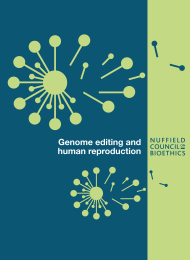Genome editing and human reproduction: social and ethical issues
Report
Published 17/07/2018

The first part of this guide looks at the potential future use of genome editing to enable people to have children who are genetically related to both parents but who will not inherit certain characteristics from them, such as heritable diseases or predispositions to disease.
The second part of this guide sets out the ethical considerations raised by these potential uses of heritable genome editing interventions, as they relate to:
- the people immediately involved, i.e. the prospective parents and their future children;
- others in society who may be indirectly affected, and society as a whole; and
- future generations, and the human species in general.
The third part of this guide explains what conditions would need to be met if the law were to change to permit heritable genome editing interventions and how these ethical considerations might inform the development and application of governance measures.
Key findings of this inquiry
We conclude that the potential use of heritable genome editing interventions to influence the characteristics of future generations could be ethically acceptable in some circumstances, so long as:
- it is intended to secure, and is consistent with, the welfare of a person who may be born as a consequence of interventions using genome edited cells; and
- it is consistent with social justice and solidarity, i.e. it should not be expected to increase disadvantage, discrimination, or division in society.
We recommend that research should be carried out on the safety and feasibility of heritable genome editing interventions to establish standards for clinical use.
We recommend that social research should be carried out to develop greater understanding of the implications of genome editing for the welfare of the future person.
We recommend that before any move is made to amend UK legislation to permit heritable genome editing interventions, there should be sufficient opportunity for broad and inclusive societal debate.
We recommend the establishment of an independent UK body to promote public debate on the use of genomic and related technologies to respond to societal challenges; to help to identify and understand the public interests at stake; and to monitor social, cultural, legal, and health impacts.
We recommend that governments in the UK and elsewhere should work with international human rights institutions, such as the Council of Europe and UNESCO, to promote international dialogue and to develop a framework for international governance of heritable genome editing interventions.
We recommend that heritable genome editing interventions should only be licensed on a case-by-case basis subject to:
- assessment of the risks of adverse clinical outcomes for the future person by a national competent authority (in the UK, the HFEA); and
- strict regulation and oversight, including long-term monitoring of the effects on individuals and social impacts.

Share